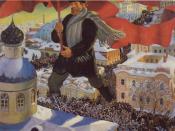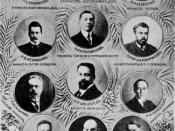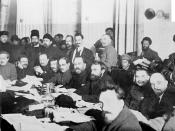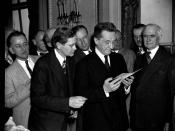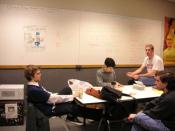One of the main reasons for the Bolshevik take over of Russia was the war situation which effectively ground everything to a halt. This is shown in source E where Kerensky is appealing to the troops and he makes a speech saying that the country was 'in danger', what he means by this is that the rule of the Provisional Government is in danger and that people must do what they can to protect it, however he does not mean that there is any threat of them being over thrown but taken over by Germany and he totally dismisses the prospect of the Bolsheviks taking power, this could be a reason why the Provisional Government were overtaken because they did not suspect that the Bolsheviks would be any form of threat and so were taken by surprise. Source B shows that as a result of the war situation the economic situation got worse thereby causing massive inflation and this was increased by he fact that a lot of farmers were conscripted to fight, Both of these sources show that the problem arose from the effects of the war.
This is also shown in source A where it gives examples of the areas that were effected, these included coal mining and also transport of goods, these areas would have been affected because all of the workers had been conscripted in to the army and so were unable to mine, also the transport system was affected due to lack of workers and so the goods were unable to be delivered. Source C shows the effect that the war had on people and how it prevented allot of people from being fed his was because of what was shown in source A which was that very little produce was being delivered to were it was needed. Source D shows that people are appeasing the war and have started up debating committees and are refusing to follow orders.
Another factor for the success of the Bolsheviks was the economic problems in Russia at the time. Source A shows to what extent and which areas were affected by the economic problems (these were partly because of the effects of war) it also gives reasons for the situation being as it is, reasons such as morale of the workers was low and the transport system was not delivering the produce. Source B show how much inflation developed and grew, at one point the value of the money dropped 144% within one month. Even though prices were increasing wages were not in accordance to the rate of inflation this caused the Provisional Government to become unpopular. In source C General Baluev is appealing to the troops, what he is appealing about is that as the war effort is decreasing food supplies are quickly growing shorter this show s some signs of the Provisional Government's weaknesses they are unable to control the situation that has arisen. As the economic situation got worse then so did the the co-operation of soldiers, whole battalions began to mutiny and refuse to obey orders. Soldiers began to create their own rules and guidelines and abolished such titles as "your honour" and "your excellency". In source K an american journalist describes the food situation, according to his account there was no bread and to get other supplies you would have to queue for hours on end.
As a result of the war effort (which was failing) people began to 'blame' the PG for the situation that they had been forced in to. In source C it show that they are becoming unpopular as they are in a compromising position with the war effort and the lack of general supplies of food, this is when Baluev has understood that if they do not win back the popularity of the people they will lose their position as government and thus make way fro the Bolshevik take-over. Source D show what action people are taking to 'boycott' the Provisional Government and end the war, it also shows that people are depressed and feel that the Provisional Government is the oppressor. Source E show that the PG are loosing control of the situation and are desperately trying to reinstall faith in the troops.
As the PG became increasingly unpopular the Bolsheviks saw an opportunity to make an advance on revolution. Source F shows a PG officer having created the 'perfect' soldier that does not have a head, this means that they will blindly obey orders, they will not answer back and they will have no moral and so will be very easy to manage. this implies that the PG do not care about the welfare of their soldiers and that they are mealy tools in their 'plan'. Source I simply shows that Lenin has decided that it is the right time for revolution and has called all of his leaders to strike immediately I think that he has made this decision because he feels that the Bolsheviks are strong at this point, whereas what has actually happened is that the PG have in fact been weakened. This does not make it a great time to overthrow the PG as the troops are not willing for change at that moment. Source J shows that a lot of Lenin's comrades warned against revolution at this point because it may back fire and fail miserably.
The Bolsheviks were reasonably popular at some points as is shown from some election results. As is shown by source L within 3 months the Bolsheviks followers had increased by 400% (from 25,000 to 100,000). Source M shows that the Bolsheviks were in fact the most popular party during the october 1917 elections.
Source N shows that the Bolsheviks were not as popular as they hoped that they would be, in the election for the constituent assembly, november 1917 they had almost half as many seats as the social revolutionaries (party of the PG) and this proved to be quite a blow to their ego.
I conclude that the Bolsheviks were not swept to power on a tide of popularity but rather they achieved power by force, although they were quite popular at points they were not popular enough to win the elections and gain power that way. Some Bolshevik leaders gave reasons for the success of the revolution, Trotsky said in source H that if it were not for things such as the creation of the M.R.C and the infiltration by the Bolsheviks in to the army, then the revolution may not have been as successful. Another factor was what sir alfred knox said in source G which was that the Army were giving up on the war and were mutinying against their officers, this means that people are already against the PG and this would make the take-over easier for the Bolsheviks. In source N it shows that the Bolsheviks were popular to some degrees but not the most popular party (the social revolutionaries were the most popular party) by almost 8 million votes, thereby proving that the Bolsheviks were only able to take control of russia by force.
